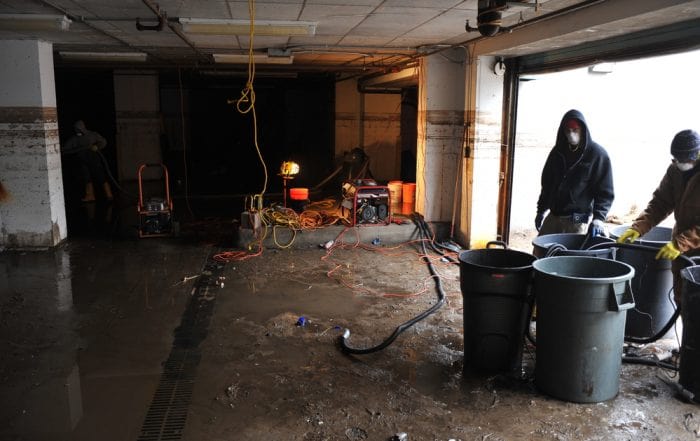Why You Shouldn’t Enter a Flooded Basement
There are several reasons not to just walk into a flooded basement, even if it’s just a few inches of water. Most of these reasons are because they are hazardous to your health. Electrical Hazards – If you have a finished or partially finished basement with plugged in items, like lights and dehumidifiers or exposed wiring, then there’s a chance there’s an electrical charge flowing through the water. This could cause an electric shock. Tripping Over Submerged Items – If the water deep and comes up to your knees or higher, you could trip and fall in your frantic rush to rescue items that can’t be in water. This could cause injuries or accidental drowning if you hit your head too hard. Sewage Water – If it’s not rain water but water from a burst sewage pipe, then you definitely don’t want to expose yourself to the bacterial load floating in that water. Exposing yourself to raw sewage without proper PPE or equipment can be detrimental to your health.
What You Should Do first
Most people keep climate sensitive items in their basements like old family photo albums or heirlooms that are delicate and can’t be exposed to the elements. Before you go rushing to save those precious items, you need to keep safety at the forefront of your mind.
Have the power cut off first
Before you enter the flooded basement, the power should be properly shut off. Shutting of the power for the entire house will insure that there will be no accidental electrocution. Once power is disconnected, you can begin the process of cleaning out the water.
Call a professional company to clean & dry the basement
Most people don’t have the wet/dry vacuums or sump-pumps required to empty out a flooded basement, and these items (along with a generator to power them since the power’s off) are expensive. Hiring a professional company like us to get the water out and the walls dry is your best and safest bet.
Have everything inspected
Once everything is dry, have professionals come in and check everything over. Damages could have happened during the flooding, and if not caught or fixed before turning anything back on. Replace anything that was damaged, especially electrical components.
Be proactive – Treat for mold before it happens
Mold spores become active after being exposed to moisture. Mold can be very toxic and spread rapidly if the area stays moist or is not treated after exposure to moisture. Having your basement treated for mold will stop it from growing, and protect your family.
Call your Insurance provider
Call your insurance provider and report the incident. Depending on your policy, the repairs and cleaning costs could be completely covered.
- Always go the safest route
- Never enter the basement alone
- Keep power disconnected until repairs are finished
- Have everything inspected by licensed professionals
Related Content >>Can A Wet Basement Make You Sick?
Conclusion
It is never truly safe to enter a flooded basement until you’ve taken all the safety precautions. You should always keep safety in mind no matter the clean up and repairs after a flood. The best way to do this is by calling flooding basement cleanup professionals like us and having us handle the mess, as we have the training and tools to get the job done quickly and properly for you.

